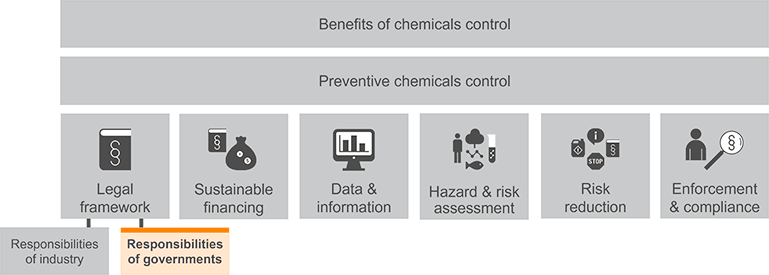Responsibilities of governments
One important actor in the management of chemicals is the government and its authorities. It is important to define the roles and responsibilities of the government in the legislation.
Division of responsibilities between governments and industry
The role of governments and its authorities is to make industry assume their responsibility by issuing relevant legislation and recommendations, enforcing the legislation, and, when necessary, banning or restricting the use of certain chemicals. It is critical that the government develops legislation that allocates responsibilities to producers, importers and users for ensuring informed choices and safe handling of products. The legislation should also allocate certain tasks and responsibilities to the national administration.
Read more about responsibilities for governments, with examples of division of tasks between national administrations, products/importers and downstream users in our Guidance on risk reduction, section 3.
An example of possible legal text describing responsibilities and obligations for actors in the supply chain can be found in our Guidance on legislation on chemicals placed on the market, section 4.9.
Develop legislation and ensure compliance
Government authorities have an important role to play in developing new legislation and ensuring compliance with the legislation.
The administration should be issuing regulations and guidelines, including for example.:
- legal requirement on classification and labelling of chemicals
- bans and restrictions on certain hazardous substances
- authorisation of certain chemicals, for example pesticides
- implementation of international chemicals conventions
The government and its authorities should identify and engage with a broad range of stakeholders when developing new legislation. This will promote the understanding of the legislation, as well as of the reasons behind the legal requirements, and is one way of ensuring that important issues are covered and achieving political acceptability for the measures.
In order to have a good compliance with the legislation, it is important that there is enforcement. Furthermore, there must be sustainable financing for the tasks carried out by the national administrations. By sustainable financing we mean sources of financing that are reliable, secure, and predictable.
Read more on the pages about legal framework for chemicals control, enforcement and compliance, sustainable financing of institutional capacity and classification and labelling.
Risk reduction
Preventive chemicals control aims at reducing risks from hazardous chemicals. The national administration should take measures regarding certain hazardous chemical substances or groups of substances to eliminate or minimise risks (where necessary). Some steps to be taken are:
- to identify the chemicals on the domestic market
- to prioritise chemicals for risk reduction
- to conduct hazard and risk assessment
- to choose risk mitigation measures
Examples of risk reduction measures could be legal instruments (for example bans or restrictions), economic instruments, or informative instruments. Read more about on the pages risk reduction measures and hazard and risk assessment.
Collect information on suppliers and chemicals
It is important for the government and its authorities to identify the chemicals on the domestic market and have information on companies producing and/or importing these chemicals. This information is valuable when prioritising chemicals for risk reduction measures and when developing and enforcing these measures. When developing legislation, it is important that the government and its authorities are having an open dialogue with the companies producing, importing and/or using the chemicals, as well as other stakeholders. Such a dialogue will often lead to better compliance. Therefore, it is important to know who these stakeholders are. It will also enable a more effective enforcement. To get this information, the national administration can set up different types of reporting systems.
Read more about this on the page about Information on suppliers and chemicals on the market.
Further resources
The UNEP Guidance on the Development of Legal and Institutional Infrastructures and Measures for Recovering Costs of National Administration for Sound Management of Chemicals (LIRA Guidance).
The UNEP LIRA Guidance External link.
External link.
UNEP has published a guidance series on national chemicals control, where one guidance document is about structure and funding of institutional capacity for chemicals control.
The UNEP Guidance "National Authority for Chemicals Control: Structure and Funding" External link.
External link.
Credits
Illustrations by Maja Modén.

